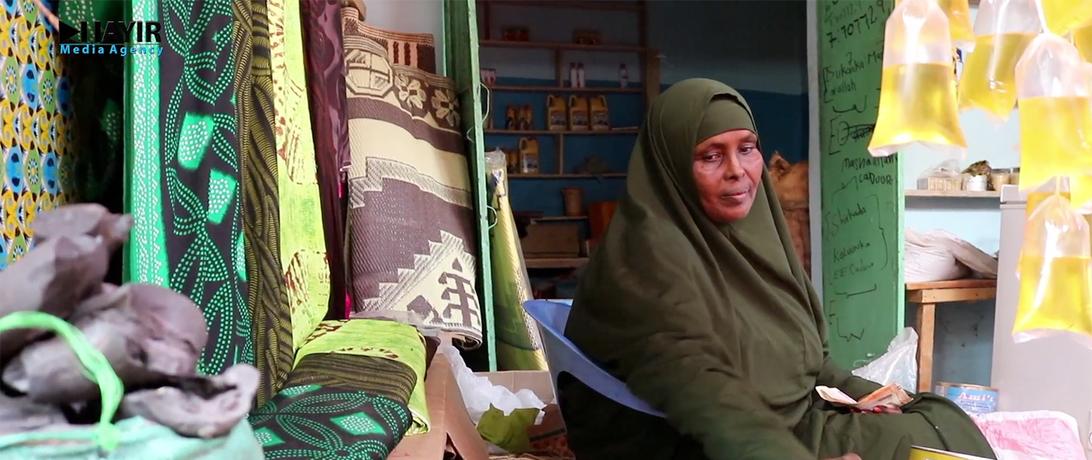
Somali businesswomen fill important roles along the fisheries value chain. In this blog we hear about and from three different Somali female entrepreneurs.
While the world wasn’t watching, Somali businesswomen have been establishing restaurants and fishing businesses and filling critical roles along the fisheries value chain. One Somali businesswoman, Halima Mohamoud Mohamed, is leveraging her experience to inspire and enhance the work of other female entrepreneurs. She understands how important women’s employment is to a successful fisheries sector and Somalia as a whole.
Halima is a skilled businesswoman with a passion for empowering women entrepreneurs. After living abroad, she returned to Somalia and tried various businesses before selecting the fisheries industry. She established the Hodan Fish Company and owns two restaurants located in Garowe and Bosaso. Halima also co-founded the Puntland Business Women Forum and serves as the Chief Executive of the Puntland Business Women Umbrella. She encourages young women to get involved in the fisheries sector, whether that means catching fish or cooking it, saying:
“Women in the fishing business should work to improve the sector, because there are a lot of fisheries resources in our country. I encourage women to work in the sector and teach others about its importance.”
The Puntland Business Women Umbrella connects Somali women across sectors, including fisheries, to grow and improve their businesses and encourage other Somali women to become entrepreneurs. Forming businesses is the first step to improving the Somali economy and women are critical to this effort. The group facilitates partnerships and mentorship between seasoned and burgeoning professionals and provides services to foster women’s business skills. The Puntland Business Women Umbrella also informs investors about the success of women-owned businesses and encourages investment in them.
The Puntland Business Women Umbrella conducts training in essential skills for businesswomen as well. Recently, the organization partnered with the Somali Institute for Development Research and Analysis and the United States Agency for International Development (USAID) Somalia to provide trainings in business skills such as budgeting, managing finances, and marketing goods.
In July 2018, the Puntland Business Women Umbrella brought together 150 businesswomen from across various sectors including fisheries to present their work and discuss women’s roles in Somalia’s economic development. The forum also incorporated Somali politicians including Puntland’s vice president and the minister of women and family affairs along with investors and international agencies such as USAID’s Growth, Enterprise, Employment and Livelihoods project and Forum SYD Somalia.
Secure Fisheries was eager to learn more about women’s contributions to the Somali fisheries sector. Two forum participants, Malyun Elmi and Asha Abdikarim Hirsi, were willing to share their stories.
This video features Malyun Elmi in her shop in Puntland. She manages Caduur Fishing Company, which is inscribed on the wall above the paintings of fish products. After the death of her husband, Malyun was left caring for their eight children alone. She prioritizes their upbringing and entered the fishing industry to provide them with a high-quality education. Malyun’s priorities illustrate that women’s incomes have ripple effects, ultimately supporting economic progress for the next generation of Somalis. Malyun has run the business for more than 10 years, selling fish, vegetables, clothing, and other small items. While Malyun’s business has not received support from donors or investors, she is satisfied with the earnings it has provided her and her family.
Asha Abdikarim Hirsi, who is also a member of the Umbrella, started Libin Fishing Company in 1999. Asha developed her business from the ground up, first selling bread and tea until she had the money to start a hotel and a fish restaurant. Asha gradually became more involved in the fisheries industry; she now markets lobsters and owns several fishing boats. Between boat ownership, the restaurant, and the hotel, Hirsi provides employment to 14 Somalis.
Halima, Malyun, and Asha provide inspiring stories for Somali women entrepreneurs, but they also face great challenges, including market challenges and low capacity in the fishing industry. Hardworking entrepreneurs and employees continue to struggle with limited resources, lacking freezers, cold transport, and fishing boats. Competition is high in the industry, and due to inflation, sellers may be forced to market fish below the purchase price.
These three women and the other forum participants exemplify the incredible talent and energy Somali women contribute to revitalizing the nation’s economy. Their work illustrates the intrinsic connection between the empowerment of Somali women and the success of the Somali economy. This sentiment was echoed at the Puntland Business Women Forum. One speaker commended the great work these women have done despite limited support: “We gathered here to show our fellow women what we can do without the help from government or international organizations; we just need our story to be heard by the rest of the world.”1 While the world wasn’t watching, Somali women have been starting businesses and creating jobs. It’s time for the world to pay attention.
[1]Puntland Women Business Umbrella, Twitter, July 24, 2018, https://twitter.com/punt_women/status/1021666403999461377.
Article Details
Published
Topic
Program
Content Type
Opinion & Insights